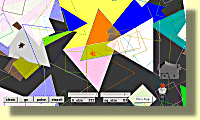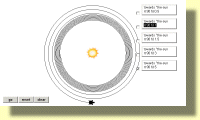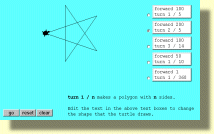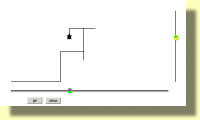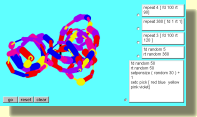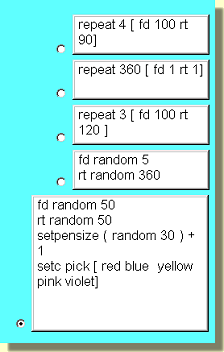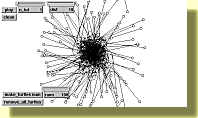random_tri_sq.zip 38KB
![]()
use winzip to unzip
to click_switch
if :click_switch = "false [
; -----
if the switch was off turn it on
; turn
the variable click_switch to true
make "click_switch "true
make "fill_shapes "true
check_switches
stop
;
stop the procedure
]
if :click_switch = "true [
; ----- if the
switch was on turn it off and...
; change
the value of click_switch
make "click_switch "false
make "fill_shapes "false
check_switches ;
call check_switches
]
end
to check_switches
; ----- show the value of fill
in the text box
ifelse :fill_shapes = "true [
set "text1 "text (se [fill
is true])
tr_click, setsh "click_on ;
turn on the click switch
tr_push, setsh "push_on ;
turn on the click switch
]
make "fill "false
set "text1 "text (se [fill
is false])
tr_click, setsh "click_off ;
turn off the click switch
tr_push, setsh "push_off ;
turn off the click switch
]
end
Draws random triangles & squares, Produces nice 50's style table top designs. Demonstrates one way to implement push buttons using turtles to control a try / false variable.
on_a_tangent.zip 9KB ![]() use winzip to unzip
use winzip to unzip
Note this project demonstrates the use of Check Boxes
Inspired by the online essay going
in circles
http://llk.media.mit.edu/projects/circles/
one_good_turn.mw2
27 KB
one_good_turn.zip 13 KB
one_good_turn.exe 76 KB
Demonstrates the use of radio buttons
Inspired by the online essay going
in circles
http://llk.media.mit.edu/projects/circles/
etch-a-sketch2.zip 4KB
![]() use winzip to unzip
use winzip to unzip
Etch-a-sketch
a work in progress

flower.zip 388KB ![]() use winzip to unzip
use winzip to unzip
In this example the colours cyan and magenta are programmed to show a text box containing information for eight seconds, and then hide the information again.


radio_buttons.zip 11KB
![]() use winzip to unzip
use winzip to unzip
This project demonstrates one way to implement radio buttons in MicroWorlds.
move_turtle2.mw2 29 KB
Yet another more complex version of move_turtle0
This is an example of creeping featurisim. I could not help adding the ability to lift the turtle using U for pu and then I had to have D for pd and then I had to be able to see the diffierence between when the turtle was up and down. And then I added colours and then I though what about white...
This is always a risk when writing programs. Creeping featurisim is also known as program bloat.

move_turtle3.mw2
82 KB
move_turtle3.zip 36 KB
move_turtle3.exe 96 KB
move_turtle3 source
code
![]() Plugin version
Plugin version
GNU License.txt
![]()
Another more complex version of move_turtle0
This version uses features from Art2 to colour the turtle as it moves
make_turtles.mw2 52 KB
make_turtles.zip 10 KB
![]() use winzip to unzip
use winzip to unzip
Uses Sliders for Input
Demonstrates how to make and remove turtles using procedures
based on code from: http://www.microworlds.com/library/math/geoboard/geoboard.zip
to remove_all_turtles
newturtle "create_a_dummy_turtle
; this is necessary
;
to make sure that there
;
is a current turtle
make "number_of_turtles count get first pagelist "turtles
repeat :number_of_turtles [
carefully [remove who][] ;
remove current turtle
]
end
move_turtle0.mw2
18 KB
move_turtle0.zip 11 KB
move_turtle0.exe 72 KB
move_turtle0 source
code
![]() Plugin version
Plugin version
GNU License.txt
![]()
make "step 50
setpensize 5
move_turtle
end
to move_turtle
pd
; read the key pressed
make "ch ascii readchar
if :ch = 38 [t1, seth 0 fd :step] ; north
if :ch = 40 [t1, seth 180 fd :step] ; south
if :ch = 39 [t1, seth 90 fd :step] ; east
if :ch = 37 [t1, seth 270 fd :step] ; west
;setc (random 15) + 125 ; add some colour
setc "black
move_turtle ; repeat the whole process again
end
harmonograph.mw2 90KB
Based on code from http://www.mulawa.net/mulawa/projects/index.html
Andrew Purdam has produced equations that allow one to
explore the beauty of the harmongraph without building one....not that
building one is any less satisfying. His equations are:
x(t) = Ax(t) sin(wx + px) + As(t) sin(ws + ps)
y(t) = Ay(t) sin(wy + py)
All initial amplitudes, frequencies (w) and phases (p) should be different and not integer multiples for the most complicated (interesting) patterns.
In order for the amplitude to decay (not necessary but
occurs in the real harmonograph) the amplitudes can decay as follows,
where d is typically a suitable small positive number. This gives an exponential
decay function.
A(t) = A(t-1) (1 - d)
everyone.mw2 14 KB
Demonstrates starting turtles & music at the same time
to go
everyone [clickon]
melody1
end
to halt
everyone [clickoff]
set "melody1 "on? "false
end
